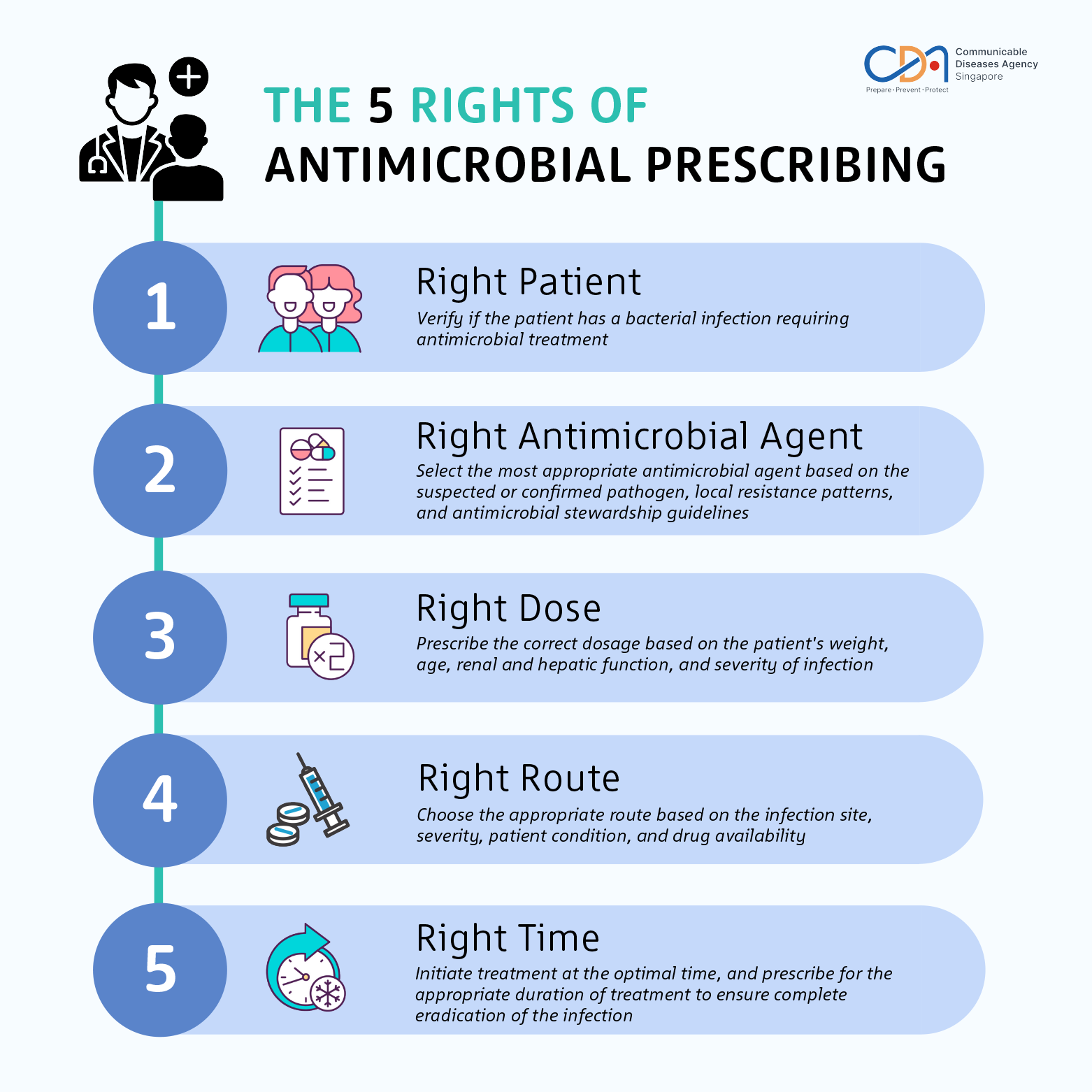The role of healthcare professionals in combatting AMR
Learn more about how healthcare professionals can contribute to curbing the spread of AMR, with downloadable resources
On this page
How can healthcare professionals play their part?
Judiciously prescribing antimicrobials plays a key role in minimising misuse.
Ensure the 5 “Rights” when prescribing, dispensing, or administering antimicrobials to patients: Right Patient, Right Antimicrobial Agent, Right Dose, Right Route, and Right Time.

Healthcare professionals should prioritise educating their patients about appropriate antimicrobial use, getting recommended vaccines, and maintaining good hygiene habits to prevent the spread of infections.
Appropriate infection prevention and control measures will further reduce the risk of spreading antimicrobial-resistant organisms. Find guidelines on infection prevention and control here.
Healthcare professionals should also keep abreast of the latest developments, knowledge, and resistance patterns in their healthcare institutions and communities to improve antimicrobial use in clinical practice.
Lastly, actions such as supporting institutional and national AMR surveillance programmes or reporting AMR outbreaks promptly to authorities are essential in controlling the spread of AMR.
Antimicrobial stewardship
Inappropriate use of antimicrobials is the largest driver of AMR. Infections from organisms resistant to last-line antimicrobials have already been observed in patients in Singapore. Measures must be taken to conserve existing antimicrobials. Antimicrobial stewardship promotes rational prescribing practices, slows the emergence of resistance, and reduces risks to the healthcare system.
Antimicrobial stewardship programmes (ASPs) have been implemented in all public hospitals since 2011. This includes the establishment of ASP teams consisting of infectious diseases physicians and ASP pharmacists. Antimicrobial usage, appropriateness of antimicrobial use, and ASP intervention acceptance rates are reported regularly to hospital management and ASP teams.
Training is available to empower individuals with the knowledge and skills needed to establish and operationalise effective ASPs. The Training and Education Division in CDA coordinates the organisation of the Singapore Antimicrobial Stewardship Training Course (SASTC) annually.
Find information on the next course here.
Antimicrobial Use Guidelines
The National Surgical Antibiotic Prophylaxis (SAP) Guideline (Singapore) provides evidence-based recommendations for the rational use of antibiotic prophylaxis, including recommended agent(s), dose, timing, and duration for adult patients undergoing clean or clean-contaminated surgeries. It aims to align best practices nationally and provide a framework for audit and surveillance, so that the rate of surgical site infections and adverse events from prolonged duration of surgical prophylaxis might be reduced. The guideline was developed through a multidisciplinary collaborative effort by the National Antimicrobial Stewardship Expert Panel (NASEP) National SAP Guideline Development Workgroup, and endorsed by the National Centre for Infectious Diseases (NCID), the Chapter of Infectious Disease Physicians, College of Physicians, College of Anaesthesiologists and College of Surgeons under the Academy of Medicine, Singapore.
Download a copy of the SAP Guideline here.
The ACE Clinical Guidance (ACG) for Urinary Tract Infections (UTI) developed by the Agency for Care Effectiveness (ACE) highlights the importance of appropriate diagnosis and treatment of UTI to reduce inappropriate antibiotic use. The ACG offers evidence-based recommendations on the treatment of UTI in adults, focusing on uncomplicated acute cystitis and pyelonephritis in healthy, non-pregnant pre-menopausal women. Principles of appropriate selection of antibiotics as well as patient education on antibiotic use and antimicrobial resistance awareness are also highlighted.
For the full list of ACGs, refer to https://go.gov.sg/all-acg.
Resources for healthcare professionals
Download these AMR materials to display at your institution:
